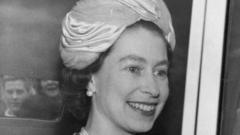Newly declassified MI5 documents show that Queen Elizabeth II was not officially informed about her art surveyor Anthony Blunt's confession to being a Soviet spy for nearly nine years.
Queen Elizabeth Ignored Spying Allegations for Nearly a Decade

Queen Elizabeth Ignored Spying Allegations for Nearly a Decade
Newly released MI5 files reveal the delay in informing Queen Elizabeth II about courtier's espionage.
Queen Elizabeth II was left in the dark regarding the Soviet espionage activities of one of her top advisors, a significant delay that lasted almost a decade. Newly declassified documents from MI5, the UK’s internal security service, reveal that Anthony Blunt, the former Surveyor of the Queen's Pictures and a key figure in the Royal Art Collection, confessed to being a Soviet agent back in 1964, yet the Queen was not officially notified until the 1970s.
Blunt's troubling past emerged when he admitted to MI5 he had provided intelligence to the Soviets dating back to the 1930s. He held his position within the royal household while denying espionage allegations even after fellow spies Guy Burgess and Donald Maclean defected to the USSR in 1951. In fact, it wasn’t until Blunt's confession during a 1964 interrogation that the extent of his involvement with Soviet intelligence came to light.
Detailed in the released MI5 files, the decision to inform Queen Elizabeth came about as concerns rose within Whitehall that Blunt's death—due to cancer—might trigger press inquiries into his past. By then, journalists had already begun investigating his history, and it was clear that the truth about his espionage could no longer be concealed.
When the Queen was finally made aware of the revelations, her reaction was reported to be remarkably composed. According to the declassified notes, she received the news “calmly and without surprise,” noting she had long been aware of his suspicious background in the aftermath of the Burgess and Maclean case.
Miranda Carter, author of Blunt's biography, hints at a possibility that the Queen had some informal knowledge of the situation as early as 1965, suggesting a desire among officials to maintain “plausible deniability.” The historical narrative surrounding Blunt's double life as a spy came to the forefront again during a statement made by Prime Minister Margaret Thatcher in the House of Commons in 1979. Blunt subsequently lost his knighthood and died in 1983 aged 75.
The MI5 files disclosed not only detail Blunt’s espionage but also include insights into other spies such as Kim Philby, highlighting the complex web of intrigue that characterized wartime Britain. The exhibition at the National Archives aims to shed light on these historical events while MI5 continues to balance transparency with national security.





















